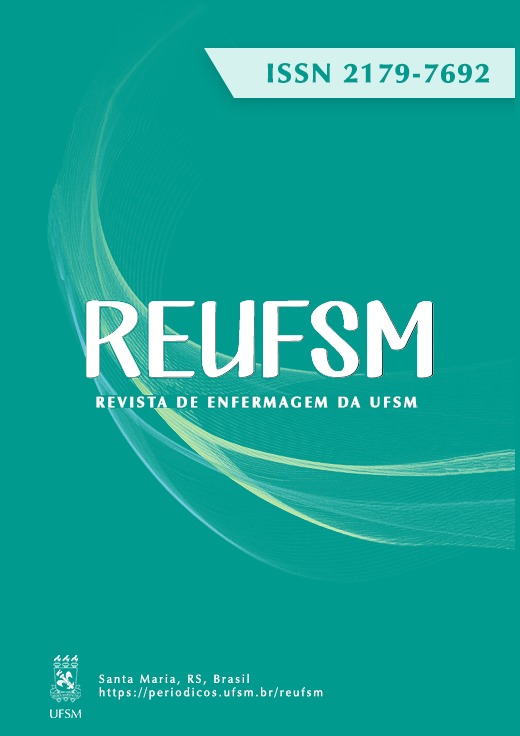Potentials and challenges of Psychosocial Care Centers in the voice of health workers
DOI:
https://doi.org/10.5902/2179769271239Keywords:
Mental health services, Mental health assistance, Psychiatric rehabilitation, Community Mental Health Services, Mental HealthAbstract
Objective: to know the perception of health workers about the potentialities and challenges of the Psychosocial Care Center (CAPS). Method: qualitative study carried out with 24 health workers from a CAPS located in southern Brazil. The data were produced between August and October 2018 through an open interview and submitted to thematic content analysis. Results: the workers identified potentialities of the service such as structuring, effectiveness, quality of care and team interaction, which generate satisfaction. However, they reported disarticulations between the service and the Psychosocial Health Care Network (RAPS), in addition to the decrease in public investments and interference of the political environment in the management of services, which sometimes led to occupational illness. Conclusion: the health workers perceived the CAPS as a powerful and effective service; however, they identified weaknesses at the level of RAPS that culminated in overload of the service and illness of the workers.
Downloads
References
Nóbrega MPSS, Silva GBF, Sena ACR. Psychosocial rehabilitation in the west network of the municipality of São Paulo: potentialities and challenges. Rev Gaúcha Enferm. 2018;39(2018). doi: 10.1590/1983-1447.2018.2017-0231
Nunes MO, Lima Júnior JML, Portugal CM, Torrenté M. Psychiatric reform and counter-reform: an analysis of a socio-political and sanitary crisis at national and regional level. Ciênc Saúde Colet. 2019;24(12):4489-98. doi: 10.1590/1413-812320182412.25252019
BRAZIL. Ministério da Saúde. Ordinance No. 3.088, of December 23, 2011. Provides for the Psychosocial Care Network for people with suffering or mental disorder and with needs arising from the use of crack, alcohol and other drugs, within the scope of the Unified Health System. Brasília: Ministério da Saúde; 2011. Available at: https://bvsms.saude.gov.br/bvs/saudelegis/gm/2011/prt3088_23_12_2011_rep.html. Accessed on 11 Feb. 2021.
BRAZIL. Ministério da Saúde. GM Ordinance No. 336, of February 19, 2002. Defines and establishes guidelines for the operation of Psychosocial Care Centers. Brasília (DF): Ministry of Health; 2002. Available at: https://bvsms.saude.gov.br/bvs/saudelegis/gm/2002/prt0336_19_02_2002.html. Accessed on 11 Feb. 2021.
Souza AC, Amarante PD, Abrahão AL. Inclusion of mental health in primary health care: care strategy in the territory. Rev Bras Enferm. 2019;72(6):1677-83. doi: 10.1590/0034-7167-2018-0806
Aypano G. Significance of mental health legislation for successful primary care for mental health and community mental health services: a review. Afr J Prm Health Care Fam Med. 2018;10(1):e1-4. doi: 10.4102/phcfm.v10i1.1429
Bezerra EBN, Silva EF, Máximo TACO, Melo JSVB. The work of interdisciplinary teams in Psychosocial Care Centers (caps). Estud Psicol [Internet]. 2018 [access in 2021 Feb 15];18(1):169-88. Available at: https://www.redalyc.org/articulo.oa?id=451858897010
Santangelo P, Procter N, Fassett D. Mental health nursing: daring to be different, special and leading recovery-focused care? Int J Ment Health Nurs. 2018;27(1):258-66. doi: 10.1111/inm.12316
Merçom LN, Constantinidis TC. Work processes and mental health of workers in the caps: an integrative review. Contextos Clínicos. 2020;13(2):666-95. doi: 10.4013/ctc.2020.132.14
Mattos MP, Campos HMN, Gomes DR, Ferreira L, Carvalho RB, Esposti CDD. Permanent health education in psychosocial care centers: integrative literature review. Saúde Debate. 2020;44(127):1277-99. doi: 10.1590/0103-1104202012724
Bardin L. Content analysis. 8a ed. Portugal: Geográfica; 2011.
Oliveira IM, Araújo RB. Potentials and weaknesses in the protection of the person with mental disorder. Cad Humanities Perspectives [Internet]. 2018 [access in 2021 Mar 04];3(2):489-503. Available at: https://cadernosuninter.com/index.php/humanidades/article/view/797
Silva GEA, Azevedo MVASA, Rosado SR, Coelho KR, Oliveira F. Experiences of alcohol and other drug users in a psychosocial care center. Nursing. 2020;23(269):4683-694. doi: 10.36489/nursing.2020v23i269p4683-4694
Leo A, Baptist AM. Pathways and impasses of deinstructionalization in the perspective of mental healht workers of the greater Vitória. Trab Educ E Saúde. 2020; 18(3):e00271102. doi: 10.1590/1981-7746-sol00271
Oliveira CA, Oliveira DCP, Cardoso EM, Aragão ES, Bittencout MN. Moral distress of nursing professionals of the Psychosocial Care Center. Science Health Colet. 2020;25(1):191-8. doi: 10.1590/1413-81232020251.29132019
Pinho ES, Souza ACS, Esperidiao E. Working processes of professionals at Psychosocial Care Centers (CAPS): an integrative review. Ciênc Saúde Colet. 2018; 23(1). doi: 10.1590/1413-81232018231.08332015.
AA Assumption, AM Pepper. Job satisfaction of nursing staff in the public health network in a Brazilian capital city. Ciênc Saúde Colet. 2020;25(1):169-80. doi: 10.1590/1413-81232020251.28492019
Debyser B, Duprez V, Beeckman D, Vanderwalle J, Van Hecke A, Deproost E, et al. Mental health nurses and mental health workers: self-perceptions of role-related clinical competences. Int J Ment Health Nurs. 2018;27(3):987-1001. doi: 10.1111/inm.12406
Zanatta AB, Lucca Mr. Burnout Syndrome in mental health workers at Psycosocial Care Centers. Everybody, cheers. 2021;45:e1572020. doi: 10.15343/0104-7809.202145390399
O'Connor K, Neff DM, Pitman S. Burnout in mental health professionals: a systematic review and meta-analysis of prevalence and determinants. Eur Psychiatry. 2018 Sep;53:74-99. doi: 10.1016/j.eurpsy.2018.06.003
Bittencourt MN, Oliveira DCP, Souza RPO, Pena JLC, Pantoja PVN, Pereira MO. Ombudsman's experience in Psychosocial Care Centers for alcohol/drugs. Rev Bras Enferm. 2018;71(Suppl 5):2287-94. doi: 10.1590/0034-7167-2017-0924
Published
How to Cite
Issue
Section
License
Copyright (c) 2022 Revista de Enfermagem da UFSM

This work is licensed under a Creative Commons Attribution-NonCommercial-ShareAlike 4.0 International License.

This work is licensed under a Creative Commons Attribution-NonCommercial-ShareAlike 4.0 International License.






